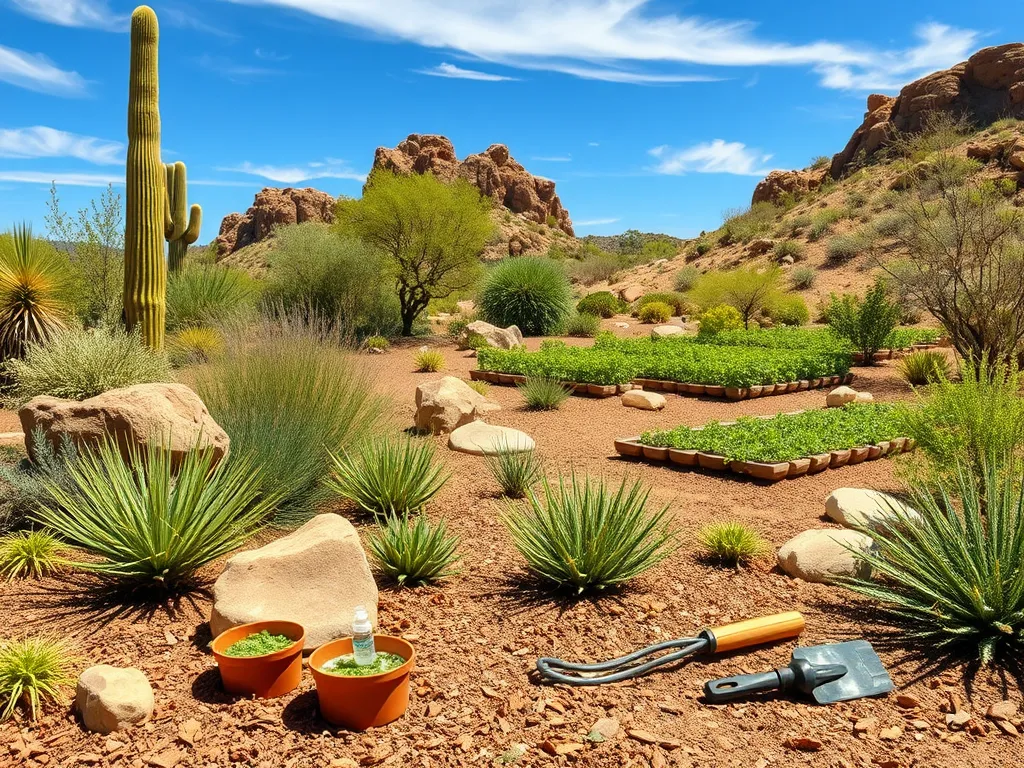Eco-Friendly Weed Control Methods for Arizona Landscapes

Eco-Friendly Weed Control Methods: Sustainable Solutions for Your Garden
Weeds are a common issue in gardening and landscaping, often competing with desirable plants for resources like nutrients, water, and sunlight. However, traditional methods of weed control, such as chemical herbicides, can have harmful effects on the environment, human health, and local ecosystems. As a result, many homeowners and gardeners are seeking eco-friendly weed control methods that are effective yet sustainable. This article explores various eco-friendly weed control methods to help you maintain a healthy, thriving garden without harming the environment.
One of the most effective and eco-friendly weed control methods is the use of native plant landscaping. Native plants are local to the area and are adapted to the local climate, soil, and wildlife conditions. They require less water, fewer pesticides, and fertilizers, making them a sustainable choice for your garden. By choosing native plants, you can create a robust ecosystem that fosters natural pest control and enhances biodiversity, which in turn will help reduce weed problems as native species out-compete invasive weeds for resources.
Another effective method is organic mulching techniques, which involve covering the soil around your plants with organic material such as wood chips, straw, or grass clippings. This method serves multiple purposes: it retains moisture, improves soil structure, and suppresses weed growth by blocking sunlight. Moreover, organic mulch breaks down over time, enriching the soil with nutrients. Implementing a healthy layering of mulch can create a natural barrier against weeds while supporting the growth of your garden plants.
People are increasingly interested in chemical-free gardening, seeking healthier ways to grow their plants.
Natural herbicides are also gaining popularity among eco-conscious gardeners. Made from plant-based ingredients, these herbicides can effectively target unwanted weeds without the negative impact of synthetic chemicals. Common natural herbicide ingredients include vinegar, salt, and essential oils. Gardeners can even create homemade herbicide recipes tailored to their specific weed issues. When used properly and with caution, these natural alternatives can offer a sustainable solution to weed problems.
Improving soil health is another vital aspect of eco-friendly weed control methods. Healthy soil supports strong plant growth, which in turn can naturally suppress weed growth. Techniques such as crop rotation, cover cropping, and adding organic matter, like compost, can enhance soil fertility and structure. Furthermore, healthy soil fosters beneficial microbial activity, which suppresses weeds and enhances nutrient cycling within the ecosystem.
Native Plant Landscaping
Using native plants in Arizona gardens offers numerous benefits, including reduced water usage and lower maintenance requirements. Native plants are well-adapted to local soil and climate conditions, making them resilient against pests and diseases, thus further minimizing the need for chemical interventions. By incorporating native species, gardeners can create beautiful landscapes that provide habitat for local wildlife while naturally controlling weed growth due to reduced competition from invasive species.
Some of the best native plants for weed suppression include Desert Marigold, California Poppy, and White Sage. These plants thrive in Arizona's arid climate and can form dense ground cover, which inhibits the growth of weeds. Additionally, the deep root systems of these native plants improve soil health and stability, which further reduces the likelihood of weed establishment.
Many homeowners are now turning to natural herbicides as a safer alternative for their gardens.
Native landscapes prevent weed growth by establishing a robust ecosystem with diverse plant species that thrive in harmony. This biodiversity creates a competitive environment for resources, making it difficult for weeds to establish themselves. Furthermore, the seasonal life cycles of native plants can create barriers to weed germination, as not all weeds can adapt to the changing conditions offered by a native landscape.
Organic weed management is becoming a preferred method for maintaining eco-friendly lawns.
Organic Mulching Techniques
In Arizona's hot and dry climate, using the right types of mulch is crucial for effective weed control. Organic materials such as straw, shredded bark, and other compostable materials are ideal as they break down and enrich the soil over time. Additionally, using inorganic mulches, such as landscape fabric, can provide an alternative, especially in areas that require extra weed suppression or stabilization during establishment.
Mulching prevents weed proliferation by smothering existing weeds and blocking sunlight necessary for weed seed germination. A thick layer of mulch (3 to 4 inches) can significantly reduce the amount of light that reaches the soil surface, creating a less favorable environment for weed growth. Moreover, the moisture retention provided by mulch can promote the growth of desirable plants while restricting weeds.
DIY organic mulching ideas for gardens include repurposing old leaves, grass clippings, or shredded paper and cardboard. Gardeners can create their own mulch by collecting and shredding yard waste and applying a layer around their plants. This not only helps deter weeds but also recycles materials that would otherwise contribute to landfill waste.
Natural Herbicides
Effective natural herbicide options for Arizona include vinegar, which is an acetic acid solution that burns the leaves of weeds upon contact, and salt, which dehydrates plants. Additionally, essential oils like clove and cinnamon oil have been shown to possess herbicidal properties. These natural options can help control unwanted weeds without the environmental consequences of synthetic chemicals.
Homemade herbicide recipes can be made from readily available ingredients. For instance, a simple mixture of vinegar and dish soap can enhance the effectiveness of vinegar as a natural herbicide by allowing it to adhere better to the leaves of stubborn weeds. Another popular recipe is a concentrated saltwater solution; however, caution must be exercised to prevent unintended damage to desirable plants and soil health.
When using natural herbicides, safety tips include testing any mixture on a small area first, as some can potentially harm desirable plants as well. It's advisable to apply herbicides on sunny days when weeds are actively growing, and to avoid windy conditions to minimize drift onto non-target plants. Always wear gloves and protective eyewear when handling concentrated ingredients to ensure safety during application.
Soil Health Improvement
Techniques for improving soil health to deter weeds include amending soil with organic matter like compost, practicing crop rotation, and employing cover crops during off seasons. These practices help to build soil structure, promote microbial diversity, and enhance nutrient availability, all of which contribute to the growth of strong plants that can outcompete weeds.
Healthy soil plays a pivotal role in weed management by fostering an environment conducive to plant growth. Strong, healthy plants can easily outcompete weeds for resources, inhibiting weed establishment and providing natural competition. Additionally, healthy soil encourages the development of beneficial soil organisms that can suppress weed seeds in the soil seed bank.
Using compost to enhance soil quality is highly effective and sustainable. Compost adds nutrients, improves soil structure, and bolsters microbial life, providing a healthier environment for desired plants while simultaneously suppressing weeds. Regular applications of compost also promote better moisture retention, supporting plant health during dry spells and reducing weed competition.
Water Management Strategies
Irrigation techniques that reduce weed growth include drip irrigation and soaker hoses, which deliver water directly to plant roots and minimize water exposure to surrounding weeds. This targeted approach not only conserves water but also prevents weeds from receiving adequate moisture to establish and thrive.
Water conservation has a significant impact on weed control, as over-irrigating a garden creates favorable conditions for weed growth. Implementing water management strategies ensures that plants receive the necessary hydration without providing excess moisture that could lead to weed proliferation.
Rainwater harvesting methods for landscaping involve collecting and storing rainwater from roofs and surfaces for future use in watering plants. By utilizing this method, gardeners can reduce reliance on municipal water sources, promote sustainable practices, and create an optimal moisture level that benefits desirable plants while helping to suppress weed growth.
Permaculture Practices
Permaculture is an approach to land management that integrates agriculture, landscapes, and ecological principles. Within the scope of weed management, permaculture emphasizes designing landscapes to minimize weed issues through strategic planting and using companion planting practices that enhance crop resilience and reduce competition from weeds.
Permaculture designs minimize weed issues by incorporating layers of vegetation that create a diverse ecosystem. For instance, planting ground cover species can shade the soil and discourage weed germination, while taller plants provide vertical space and establish canopies that suppress weed growth. A permaculture system considers the natural relationships between plants and utilizes these to foster natural weed control.
Successful permaculture projects in Arizona demonstrate the effectiveness of integrating diverse plant life to enhance garden resilience and manage weeds sustainably. Community gardens and ecological farming projects focused on permaculture principles provide excellent examples of how to create landscapes that thrive without reliance on chemical herbicides, promoting healthy soil and plant diversity instead.
Integrated Pest Management (IPM)
IPM strategies for sustainable weed control involve combining different management practices to minimize reliance on any one method. Effective IPM may include scouting for weeds, using mechanical and biological methods of control, and implementing cultural practices that enhance plant health and reduce weed competition.
Combining mechanical and biological methods, such as hand-pulling weeds or using hoes along with mulch or natural herbicides, can create an effective strategy for managing weed infestations. This integrated approach takes advantage of multiple control methods in conjunction with one another, helping to ensure unwanted weeds are kept at bay effectively.
Beneficial insects play a crucial role in weed management through ecological balance. Some insect species, such as certain ladybugs and predatory beetles, can help control populations of pest insects that may thrive in weedy areas. By fostering a habitat that attracts beneficial insects, gardeners can reduce the need for chemical interventions and promote a healthy garden ecosystem.
